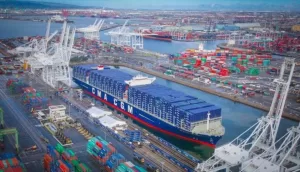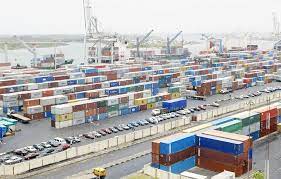Over the last 5 years, Nigeria has lost $7 billion annually to poor management and inefficiency of the seaport.
This has become a source of concern for the members of the House of Representatives. At the plenary, they wondered why the country is losing so much revenue.
He also noted that the under-utilisation of seaports outside Lagos had significantly affected the sector’s contribution to Nigeria’s revenue. This further affects the Gross Domestic Product (GDP).
Togo, Benin Republic Getting The Revenue
“Most ships bringing goods to Nigeria prefer to go to other ports order than Nigerian ports.
“Indeed, the Benin Republic benefits from Nigeria’s large market, while Cotonou remains a popular importer’s haven, huge trade cargoes are lost to Togo and other neighbouring countries.
“Why is the nation unable to provide adequate infrastructure and reduce pressure on Lagos ports and why is it that the Calabar, Port Harcourt, Warri, and Koko ports cannot be developed as a haven for importers in the region?
“The lack of adequate infrastructure and capacity in the growing cargo and maritime business is a significant issue,” Ihonbvere said.
Furthermore, the lawmaker revealed that the Apapa Port in Lagos had lost West Africa’s leading position to the Port of Lomé due to congestion and poor-quality services to shippers.
“Port of Lomé, with a capacity of 1.1 million twenty-foot containers, overtook Lagos Port due to Modernisation reforms which tripled its capacity from 311,500 containers to 3.1 million, thus making ‘Togo’s Port of Lomé becoming a regional transit hub.”
You May Also Like: Nigeria, Benin Republic Airport: Tourist Makes Important Comparison
“Nigeria’s Apapa Port, Lagos, which handles about 1 million TEU annually, lost 30% of its container traffic for over five years due to several factors bedeviling its inability to deliver efficient services to cargo owners.
“This explains why Nigerian ports have remained inefficient over the years. Also, Nigeria’s major seaports in Lagos do not have deep draughts to handle bigger vessels, the motion further read.
After hearing the motion, the House directed the concerned Committees to look into ways to identify the gaps militating against the full realisation of the economic advantage of ports, harbours, and other blue economy in Nigeria.

 Nigeria has lost around $7 billion due to poor management of its various seaport facilities.
Nigeria has lost around $7 billion due to poor management of its various seaport facilities.
